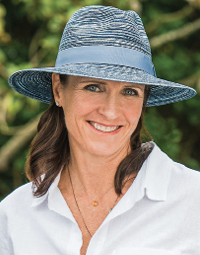Top Hat and Tales
Stephanie Carter is the co-founder, president, and chief executive officer of Wallaroo Hat Company, a Boulder, Colorado-based manufacturer of stylish sun-protective hats, founded in 1999.
Responsibilities: Supply chain logistics, overall operations, design, manufacturing, marketing, and human resources.
Education: B.A. in Spanish and French language and literature, cum laude, New York University, 1989; J.D., University of Denver School of Law, 1993.
On a trip to visit my husband’s family in Australia in 1998, I discovered the secret to fashionable sun protection: stylish canvas hats unlike any I had seen. I brought some back to the United States and every time I wore mine, people asked where I got it.
I contacted the Australian designer and suggested working together to bring his designs to the United States. I used my legal background to form Wallaroo Hat Company in 1999; a wallaroo is a small kangaroo common in many parts of Australia.
For the first 10 years, we manufactured our hats in the Philippines. I would travel to the factory several times each year to design products and meet with our manufacturing team. I learned a lot about imports, distribution, and shipping.
Outsourcing Challenges
When our manufacturer in the Philippines went out of business, we moved manufacturing to China. One challenge at the time was the perception of forced labor in China. We worked hard to ensure we were spending time in our factories and upholding high standards of work ethics and transparency. Wallaroo, a Certified B Corporation, is conscientious about the people who work in our factories, as well as our environmental impact.
Occasionally we hear from customers that they would prefer our products to be made in the United States, but this is simply not practical. Virtually all raw materials come from overseas. Also, the United States no longer has the machines and skilled laborers needed to make our hats.
A more recent challenge has been the 25% tariffs on items imported from China. Several years ago, I had to do a mid-season price increase—the first in Wallaroo’s 22 years. Our customers were understanding, but we are still fighting to get the tariff removed as it punishes manufacturers and their customers.
Our goal has always been to produce a product that provides protection against the dangers of skin cancer—we’ve been a pioneer in the sun protection movement—but we want it to be affordable. If we moved manufacturing to a country other than China, we’d have to assess how long it would take to set up a new factory and how much it would cost. There is no easy answer.
The tariffs and the COVID-19 pandemic have been our biggest challenges. I’m fortunate to have a dedicated staff with a can-do attitude and a willingness to make sacrifices when necessary.
Entrepreneurial Spirit
Since I was young, I’ve had an entrepreneurial spirit and have been engaged in different ventures. When I was in law school, I started a Mexican housewares import business with one of my classmates. We would fly to Mexico, buy the items, and import and sell them in the United States.
Last year, I co-founded a nonprofit organization called PridePads Africa. Our mission is to manufacture biodegradable sanitary pads to distribute to girls and women in rural parts of Cameroon, Africa, to ensure they can stay in school.
We purchased the machine to make the pads in India, where they invented this technology. I had to figure out how to move the machine from India to Cameroon—on the opposite side of the African continent. It took time, it’s expensive, and we had to deal with different customs regulations in India and Cameroon.
Our facility opened in late December 2019 in Ngaoundere, Cameroon. We have had a lot of positive feedback from the residents, as nobody brings projects to this region because it’s so remote. It’s touching to know we’re able to make a difference in the lives of girls and women and help empower them.
Stephanie Carter Answers the Big Questions
1. What superpower would you like to have?
I would love to speak every language in the world. Being able to communicate with people in their native tongue is powerful and uplifting.
2. Are there any outside activities that make you better at supply chain management?
Pre-pandemic, I was a huge international traveler. Travel gives you an interesting view into supply chain management. You see the way other people live and where raw materials come from. You also capture a global understanding of supply chain management.
3. What are your words to live by?
My favorite expression is: "It’s none of my business what other people think about me. What matters is following your own true path and doing the right thing." We can get so caught up worrying about what other people think about us, that we spend our energy trying to be something that we’re not.

